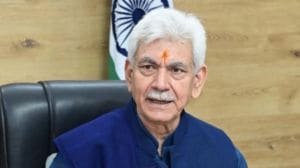ATCs finally move to Raytheon radar
NEW DELHI, JAN 1: After several weeks of suspense, and virtually eyeball-to-eyeball confrontation with the Airports Authority of India (A...

NEW DELHI, JAN 1: After several weeks of suspense, and virtually eyeball-to-eyeball confrontation with the Airports Authority of India (AAI), the Air Traffic Controllers (ATCs) today finally — albeit grudgingly — switched over to the new Raytheon radar system at the Indira Gandhi International Airport (IGIA).
The shift to the more modern system — which offers more precise information on an aircraft’s location — began this morning, with the ATCs reporting at the new communication tower which houses the Raytheon radar, purchased for Rs 423 crore. Till last week, as The Indian Express has been systematically pointing out, the ATCs were refusing to shift to the new system, and were trying, indirectly, to link this with demands for a sharp hike in their salaries.
Though the ATCs today admitted that the functioning had become “more smooth”, they refused to take any responsibility for air safety. The ATCs are responsible for ensuring safe landing and take off of aircraft, by minute and carefulcalculations.
Though all the units of the Raytheon radar started functioning today, the old system will remain on a “hot standby” for shadow operations, till January 11. This is just so that operations can be shifted back to it, in case of some unforeseen situation in the new Raytheon system.
Sources in the AAI said that the formal inauguration of the Raytheon radar will be on January 11 or thereabouts, after the system has been tried and tested. “We are not expecting any problems, but we are keeping our fingers crossed,” an AAI official said.
Even today, however, several months after they have been trained on the Raytheon system, the ATCs continued to voice doubts about the new system. “There are certain features in the Raytheon system which can lead to errors being committed by the ATCs. Our main concern was safety. But if the Airport Authority of India (AAI), the Directorate General of Civil Aviation (DGCA) and the Ministry of Civil Aviation are not worried about the safety issue, then whyshould we?” questioned Brijendra Shekhar, general secretary of ATC Guild.
The Air Traffic Controllers had come under fire recently for trying to link their demands like wage hikes, to switch over to the new Raytheon radar. “We were being wrongly accused. That is why we thought, okay, let them shift to the Raytheon. What we had wanted was to let both, the old and the new system, to continue together for some time. To let the ATCs get used to the functioning of the new system. And in case of an emergency, we could switch to the old system which was on standby,” the ATC Guild general secretary said, trying to justify the position taken by the ATCs.
Speaking for the ATCs, Shekhar said that though the basic operations would remain the same in the new system, there were some changes which would make the working difficult. “It is a very complicated system, not a simple menu driven programme. There are some (Air Traffic Controllers) who know the system, but there are others who don’t know it at all,” hesaid ominously.Meanwhile, Prime Minister A B Vajpayee today announced the Government’s decision to corporatise Mumbai, Delhi and Bangalore airports, allow 100 per cent foreign equity in airports infrastructure and establish a regulatory framework for airports.
Inaugurating the new International terminal at the Bangalore airport, Vajpayee said international experience showed that the large sums needed for building new airports and upgrading the existing ones could only be raised in a framework of corporatisation.






- 01
- 02
- 03
- 04
- 05

























